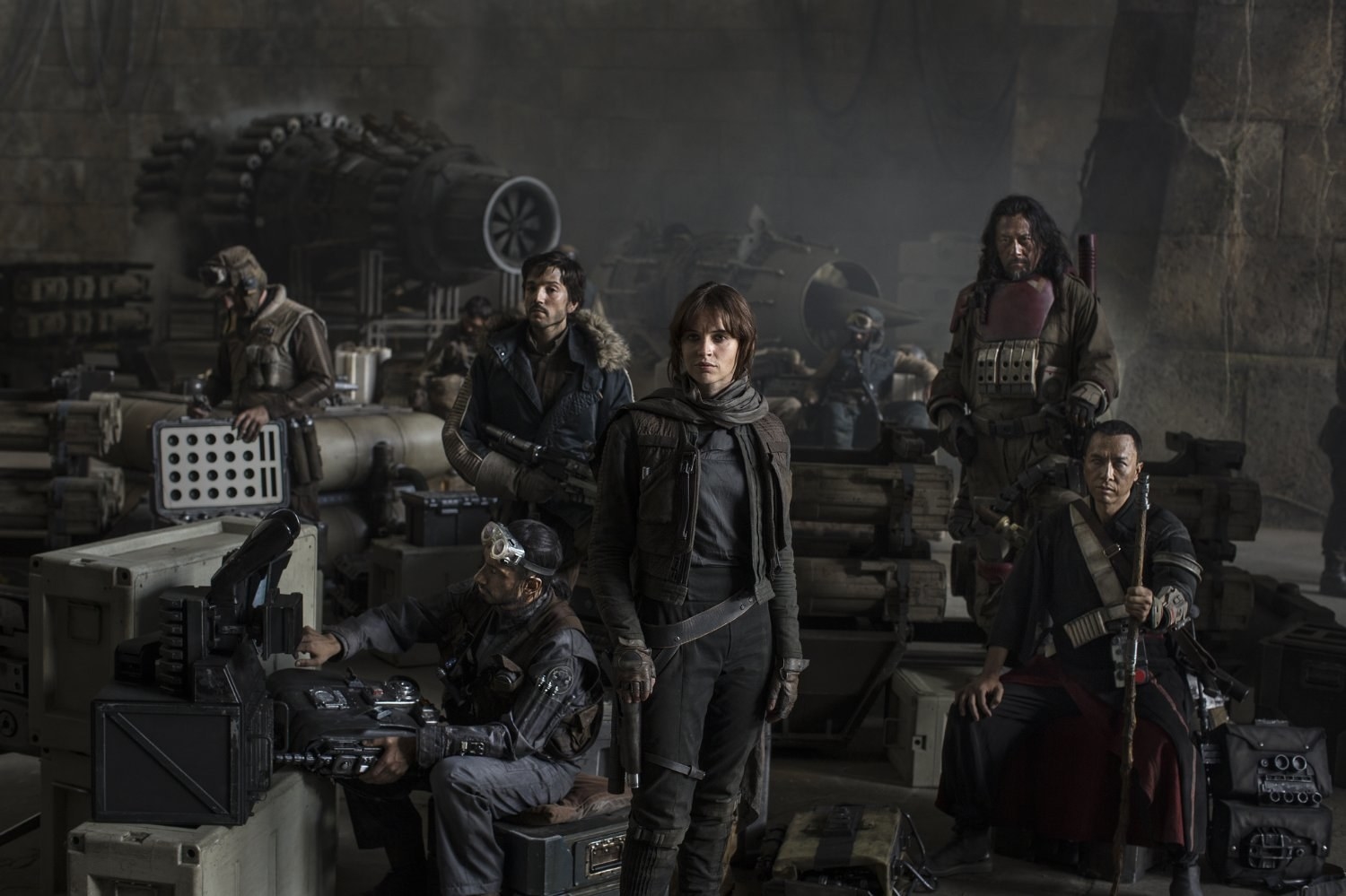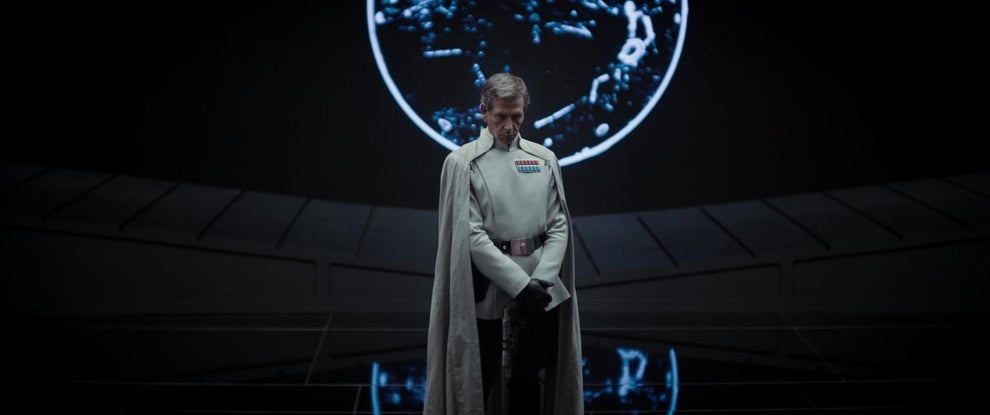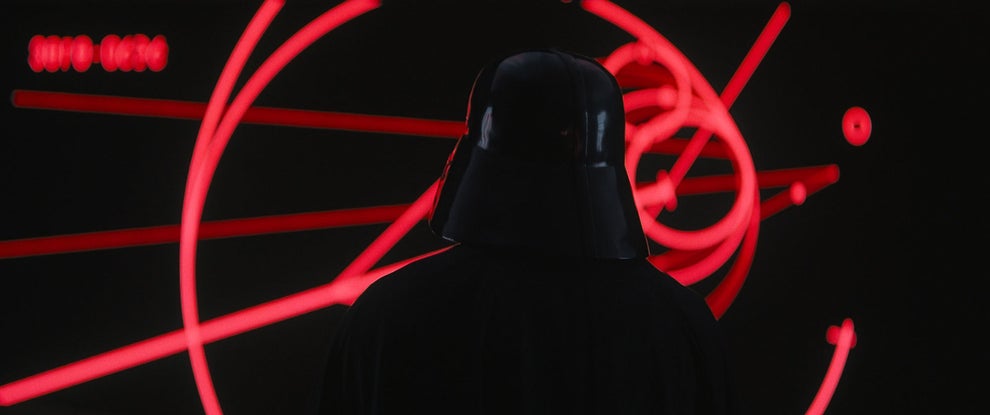
Bodhi Rook (Riz Ahmed), Cassian Andor (Diego Luna), Jyn Erso (Felicity Jones), Baze Malbus (Jiang Wen), and Chirrut Îmwe (Donnie Yen) in Rogue One: A Star Wars Story. Jonathan Olley & Leah Evans / Lucasfilm Ltd.
A few days after the election, Rogue One screenwriter Chris Weitz and Gary Whitta, another writer who worked on the film, kicked a reactionary hornet’s nest on social media. In the wake of Donald Trump’s win, Weitz tweeted, “Please note that the Empire is a white supremacist (human) organization,” to which Whitta chimed in, “Opposed by a multi-cultural group led by brave women.” (Both tweets have since been deleted.)
As takes go, these aren’t particularly chancy ones — Nazi Germany has provided inspiration for the Empire from the start of the Star Wars franchise, and Whitta was pointing out an unmissable fact of casting. But because we’re now, astonishingly, living in a moment in which equating white supremacy with evil can be considered a bridge too far, the portion of Twitter that’d describe itself as alt-right exploded with rage. They were also spurred on by falsified claims that a version of the film had called Donald Trump — not a known part of the Star Wars universe — a racist, and by their insistence that studio entertainment and politics shouldn’t mix.
The hashtag, #DumpStarWars, was spawned.
An attempted Star Wars boycott sounded just as likely to damage the giant franchise as the proposed Hamilton one, but Weitz ended up apologizing (while leaving a safety-pinned emblem with “Star Wars against hate” up). This week, Disney CEO Bob Iger assured angry internet denizens that their popcorn was safe from any seasoning of unwanted relevance. “I think the whole story has been overblown and, quite frankly, it’s silly,” he told the Hollywood Reporter. “This is a film that the world should enjoy. It is not a film that is, in any way, a political film. There are no political statements in it, at all.”
The calculating corporate authority folded, and the ragtag army of keyboard rebels sorta won. If you squint — and have a particularly grim sense of humor — it’s a little like the arc of a Star Wars movie.
It’s always been both a feature and a bug of the beloved franchise that it’s so uncomplicated for anyone to project themselves on the side of the scrappy Rebel Alliance. But no matter how appealing the mythology, the world is not made only out of righteous underdogs — there’s also the oppressive Galactic Empire.
Iger is wrong, of course. Rogue One is not a scathing anti-Trump allegory. It is, it turns out, a fairly minor addition to the Star Wars ’verse, but it is political. All movies, no matter how silly, serious, or space operatic, are political in terms of how they represent their universes and their expected audiences, and in terms of what they reinforce as normalcy.
Orson Krennic (Ben Mendelsohn) in Rogue One: A Star Wars Story. Lucasfilm Ltd.
Rogue One was directed by Godzilla’s Gareth Edwards, and chronologically, it occupies the sliver of time right before the start of Star Wars: Episode IV — A New Hope. It lays out largely unnecessary groundwork for the original trilogy, but it also provides a minor-key prelude to a set of films all about swashbuckling adventure. Its characters aren’t predestined heroes or powerful Jedi; they’re soldiers and spies, the sort that fight and fuel and sometimes die during skirmishes. Rogue One doesn’t just make you feel its battles, it meddles with Star Wars’ fundamental moral divide, blurring the lines between the sides, and giving its main character, the steely Jyn Erso (Felicity Jones), plenty of reason to need to be won over.
Spy Cassian Andor (Diego Luna), for instance, is a loyal agent of the Alliance, but he’s shown blasting a few non-Empire folks for pragmatic reasons, and he has been known to act as an assassin. Bodhi Rook (Riz Ahmed) is a former Empire pilot who takes huge risks in order to swap sides, only to be tortured by the very parties he’s trying to help. The Alliance is divided, distrustful, and prone to disagreements, having splintered and birthed some extremist groups. The Empire — well, the Empire’s still chilly, cutthroat, powerful, and embodied by a sinister white man (Ben Mendelsohn as Orson Krennic) because there’s only so far these characterizations can be reworked. But now we see figures who doubt it and come to defect, among them Jyn’s father, Galen Erso (Mads Mikkelsen), a reluctant architect of the Death Star trying to pass along information about a weakness in the planet-sized weapon.
Rogue One is at its best when it’s at war — it has some bruisingly good action sequences, many centered on Hong Kong action star Donnie Yen as the staff-wielding blind warrior Chirrut Îmwe. He’s got a carbine-carrying pal, Baze Malbus (Jiang Wen), and they join up with Jyn and Cassian. There’s a former Imperial enforcer droid named K-2SO (Alan Tudyk) whose lack of filter and any elegance makes for the bulk of the film’s scattered humor. These characters scramble from planet to moon to planet on a mission that ultimately has them retrieving plans for the Death Star. But their development is considerably less of a priority than the fighting they do (though the capable Jones, at least, manages to sells Jyn’s quiet transformation from indifferent outsider to true believer in every determined clench of her jaw).
Rogue One collects characters with a casualness that makes them all feel like they could be potential cannon fodder, or at least disposable, especially as the film readies to join up with A New Hope in its final act. When a few familiar faces, ship designs, and fabulously old-timey futuristic bits of technology make an appearance, they’re fan service, but they’re also a reminder that we already know what happens next — and it doesn’t feature any of the characters we’ve more recently been introduced to.
Darth Vader (voiced by James Earl Jones) in Rogue One: A Star Wars Story. Lucasfilm Ltd.
Even when they’re getting inadvertently diminished by their own franchise, though, there’s a deliberateness to Jyn and her comrades that feels like it could make a lasting mark on the Star Wars brand. They’re a band of women and people of color, a choice that’s echoed, to a lesser extent, in the array of characters we see at the Alliance base, with droids and non-humans scattered in. The Rebellion, in Rogue One, is dominated by the marginalized in a way that’s specific, and that provides a particular foundation in its fight for freedom — broad and generic no longer. It’s a quiet touch, but it’s unmissable — you might even call it political.




